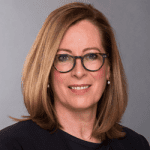Why International Women’s Day Feels Different in 2018

8 March 2018 at 9:01 am
Australian Women Donors Network CEO Julie Reilly, explores why this year’s International Women’s Day, with #pressforprogress and #leavenowomanbehind, feels a little different, and why it is time for philanthropy to put its gender glasses on.
There is no doubt that we are in a pivotal time of change for women and girls and, let’s hope, for all society.
The events that have unfolded since the 2017 US presidential election have shone a new spotlight on the age old problem of gender inequality. The global women’s Marches, #metoo movement and the TimesUp campaign have produced a palpable shift in our cultural tolerance for gender-based mistreatment.
In the process they have lifted the veil on the pervasive nature of sexual abuse and on the depth of feeling that women (and many men) have about the consequences of women’s disadvantage.
Women have always known and felt strongly about these issues. What’s changed is that the high profile public revelations by celebrities, that began with Harvey Weinstein, have spread rapidly across the globe through the #metoo movement, to all levels of society.
This social movement left us in no doubt about just how endemic sexual harassment is across all societies. These are not experiences limited to women in developing nations, but are widespread experiences affecting women of all ages, races, professions and economies across the globe.
What feels different is that men are seeing the problem in a way that has not been as visible or clear to them before. They are understanding the need for change in the world if their daughters, sisters, wives, mothers and aunts are to be safe and able to realise their potential.
So what does this shift in consciousness mean for philanthropy and for those working in the social sector more broadly?
It means it’s time to put on those gender glasses and be clear-sighted about the way that social issues, cultural attitudes and public policies often affect girls and women differently.
As someone working to increase social investment in women and girls through the Australian Women Donors Network’s education, influence and gender-wise tools, I’m hopeful it means a greater willingness to apply a gender lens to grant-making and to broader philanthropic practice.
We need to ensure women’s circumstances, experiences and insights are sought out and considered at all steps in the process from the initial analysis of the problem to the design and delivery of the program or services by NFPs.
By building a gender lens into the grant application; assessment criteria; funding decisions made by trustees and directors and board level; and evaluation of impact, funders can be more informed, more effective and more confident their investment is having the maximum impact.
The Australian Women Donors Network has been on this quest for some time, building on the gender lens work developed by Mary Crooks AO, executive director of the Victorian Women’s Trust, as a director of our original board.
We’ve been greatly encouraged by the inclusion of gender lens questions by SmartyGrants in their grant-management software and in particular by the take up by Perpetual of these questions in their IMPACT grants.
While a significant number of individual funders and foundations prioritise women in their grant-making, it’s the systemic change driven by applying a gender lens across all social issues that will drive real change. We are pleased that these gender lens questions will also be introduced into Blackbaud’s GIFTS Online software in the next couple of months.
On Friday, in partnership with Philanthropy Australia, we will launch a Funder’s Group for Women and Girls to bring together individual philanthropists, trusts and foundations to share, learn and collaborate together for the benefit of women and girls.
So wherever you work in the social sector, we believe the best way to increase impact and achieve better outcomes is to ensure that women and girls are seen clearly, and are supported to help drive the change you want to see.
I’m writing this at Auckland airport en route home from a fabulous and uplifting event convened by Dellwyn Stuart of the Auckland Foundation. On Tuesday 6 March, Women Give 2018 brought together over 100 New Zealand women (and a couple of good men) to explore, encourage and support women’s giving, and in particular giving to girls and women.
The following morning one of the participants and speakers from the event, Kate Tindall Lum, invited Dellwyn and myself to meet with her family and key staff at the Tindall Foundation, a leading funder in NZ, to see how they might increase their impact through a more intentional and deliberate focus on gender equality.
The openness, curiosity and intelligence the Tindall Foundation showed about their areas of social change, and the willingness to examine their own philanthropic practice, was an absolute breath of fresh air.
Tuesday’s event and Wednesday’s discussion has left me filled with renewed optimism and energy – and that is the best International Women’s Day gift ever.
Happy International Women’s Day to all who continue to #pressforprogress!
About the author: Julie Reilly is the chief executive officer at the Australian Women Donors Network. She is passionate about sharing the benefits of investing in women and girls through philanthropy and social investment, and was recognised for her impact in this work in Pro Bono’s inaugural IMPACT 25 Awards. Prior to leading the Australian Women Donors Network, Julie’s diverse experience spanned government, corporate, NFP, university and media roles.








